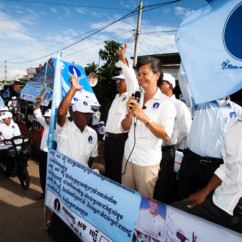Mu Sochua
2017 Fellow

Mu Sochua, a recent Nobel Peace Prize nominee, is one of the most prominent women in Cambodian politics. For over twenty years, she has been at the forefront of her country’s efforts for democratic reform, free elections, and human rights.
Hailed by The New York Times as a “a member of a new generation of women working their way into the political systems of countries across Asia,” Sochua is combating the tragedies of human trafficking by empowering women to seek political office and fighting for free elections to ensure the voices of Cambodian voters are heard. In 2002, Sochua helped to mobilize 12,000 women candidates to run in the commune elections. Over 900 were elected, ushering in a new generation of female leadership in Cambodia.
Born and raised in Phnom Penh, at age 18 Sochua was forced to flee to the United States when war and genocide took hold of her native land. Her parents were killed by the Khmer Rouge, along with over two million fellow Cambodians.
After 18 years of exile, she returned to Cambodia and found her country transformed into what Time magazine called “a pervert’s paradise” where women and girls were traded like currency. Accompanying sex workers on their nightly “shifts,” Sochua saw first-hand the dangers that befall these young girls (many below the age of 16) on a nightly basis.
She set out on a career defending the rights of women, laborers and farmers. In 1993, Sochua succeeded in incorporating strong provisions into the Cambodian Constitution, improving human and women’s rights across the nation. With support from the United Nations Fund for Women, Sochua helped to organize Cambodian women’s participation in the 1995 UN Fourth World Conference for Women. She arranged for over a thousand women to travel to Beijing for the conference, many of them from indigenous populations.
In 1998, Sochua won a parliamentary seat in a northwestern province of Cambodia, one of the nation’s most devastated regions. In the same year, Sochua became Minister of Women and Veterans’ Affairs, one of only two women to join the cabinet. As a Cabinet member, Sochua authored the Domestic Violence Law, and negotiated an agreement with Thailand to curtail human trafficking in Southeast Asia and allow Cambodian women trafficked as sex slaves to return home instead of being jailed as criminals. Sochua also launched a campaign to engage NGOs, law enforcement officials, and rural women in a national dialogue on women’s development.